Charles E W Bean, Diaries, AWM38 3DRL 606/252/1 - 1918 - 1935 - Part 5
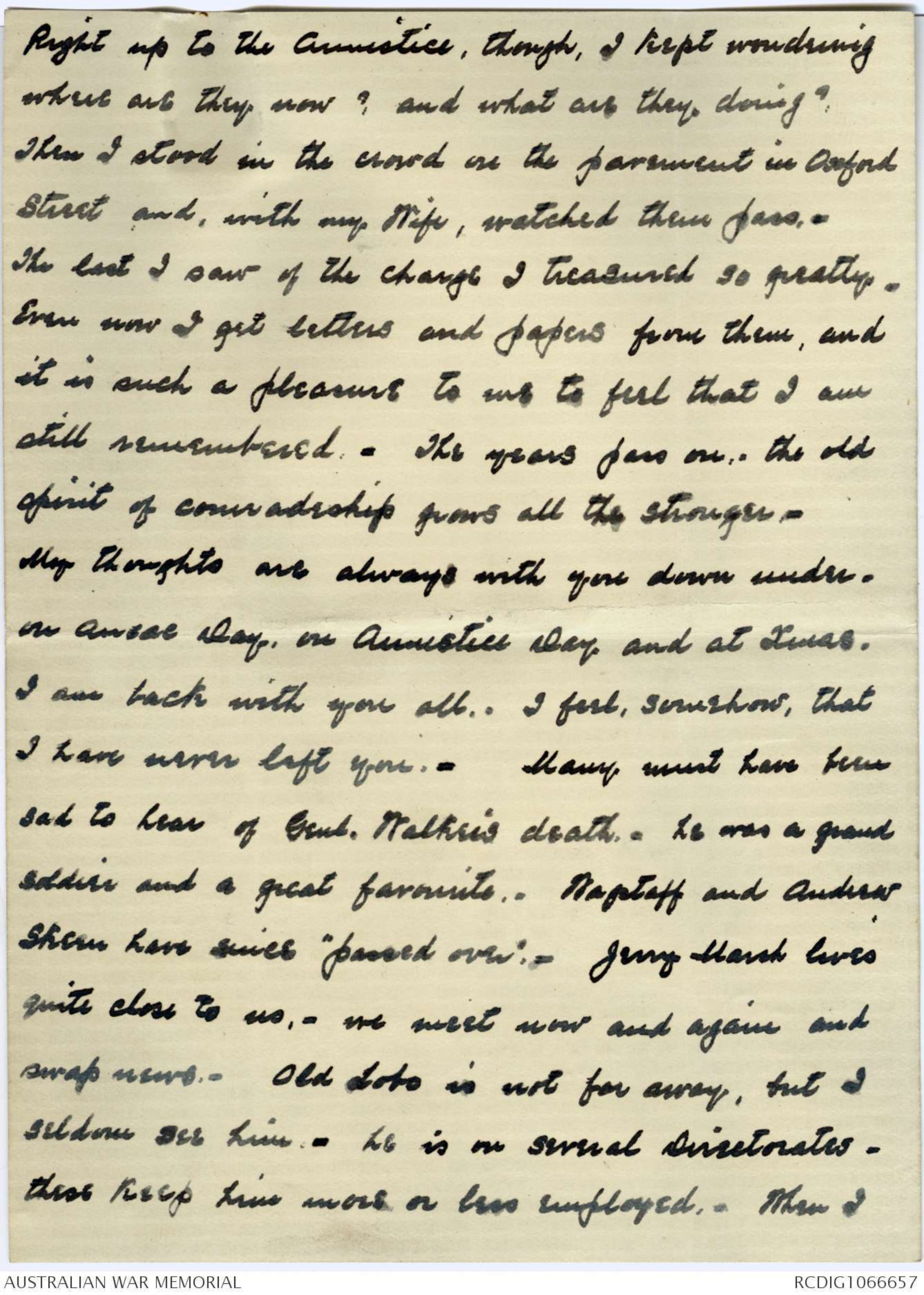
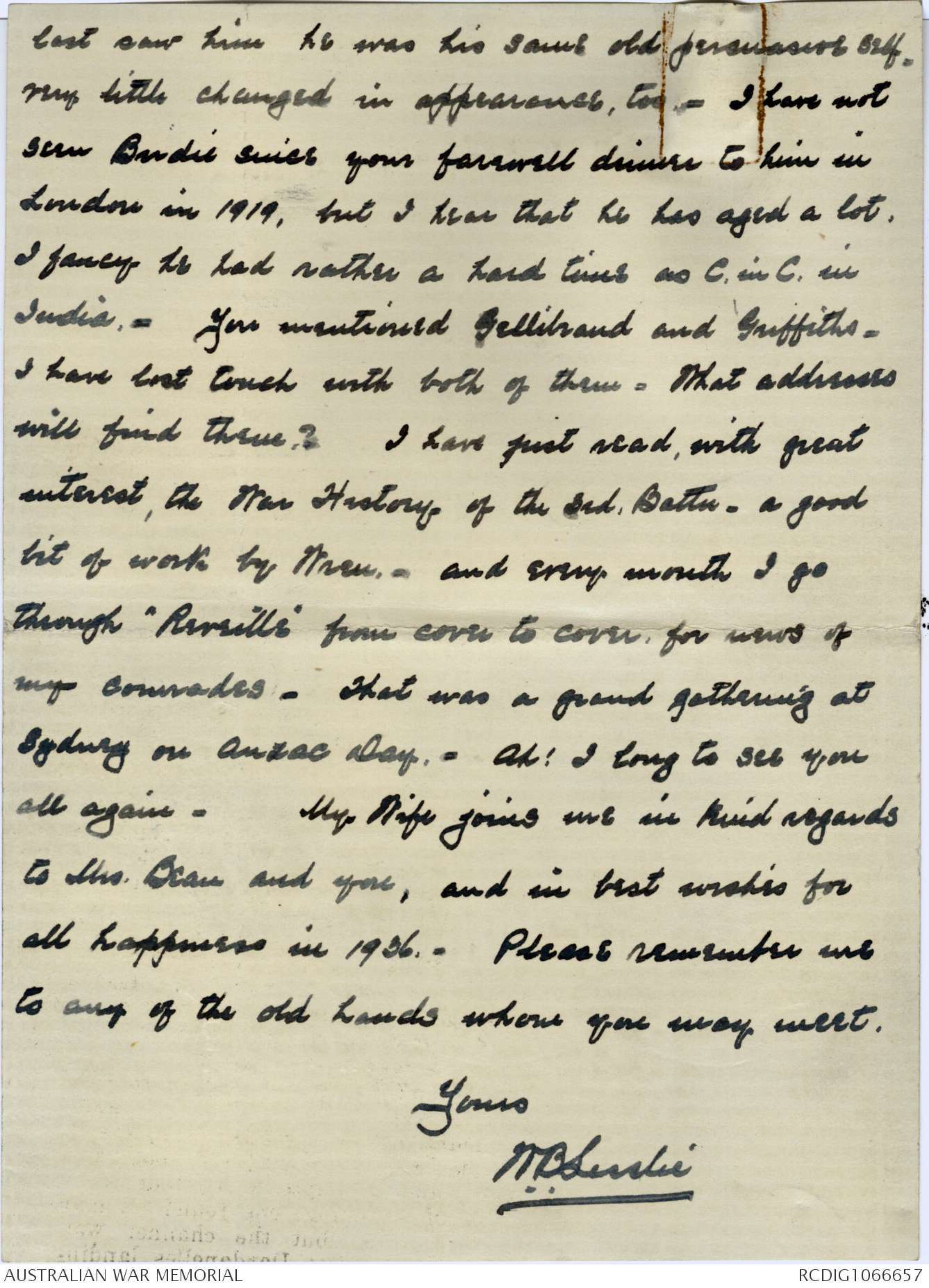
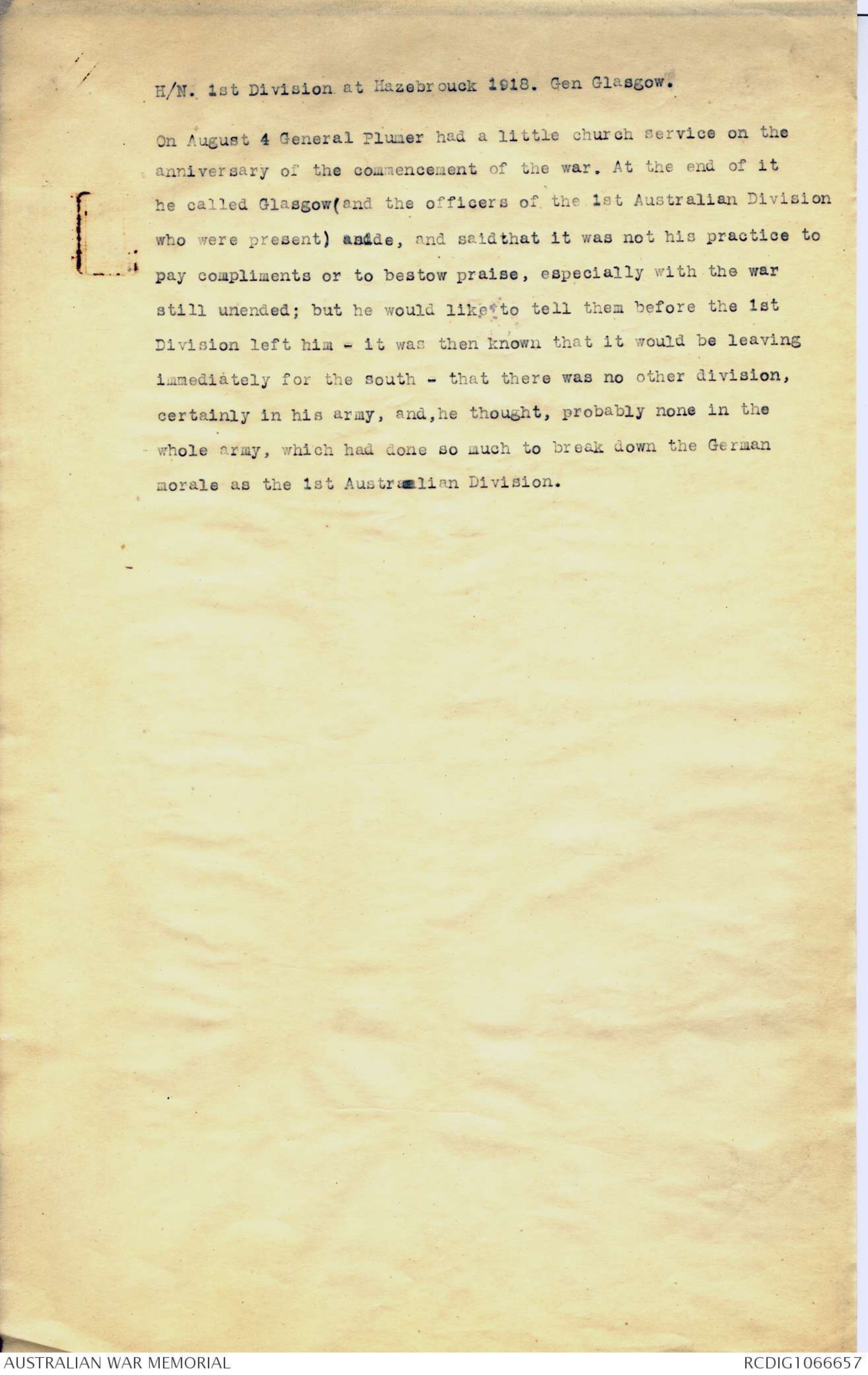
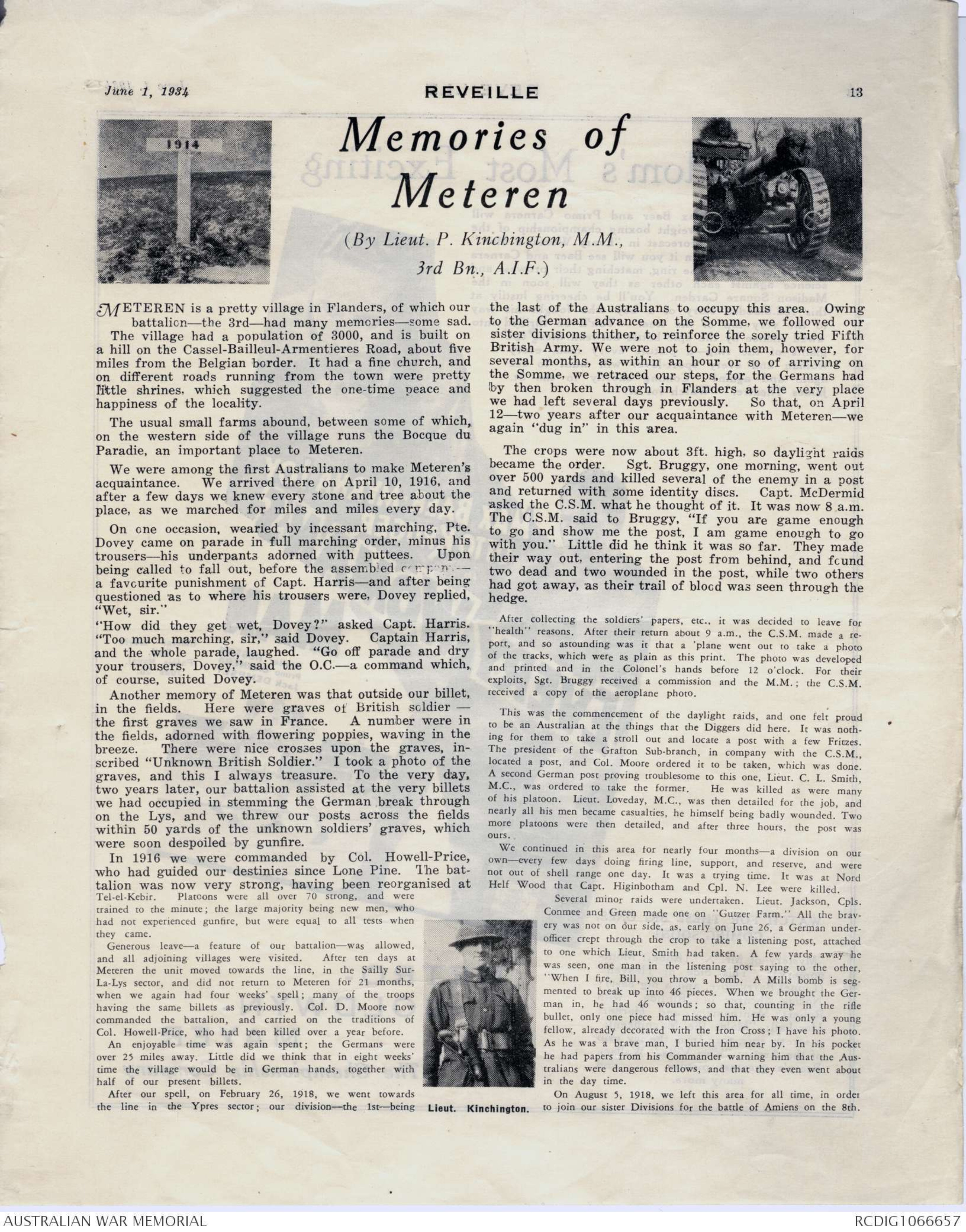
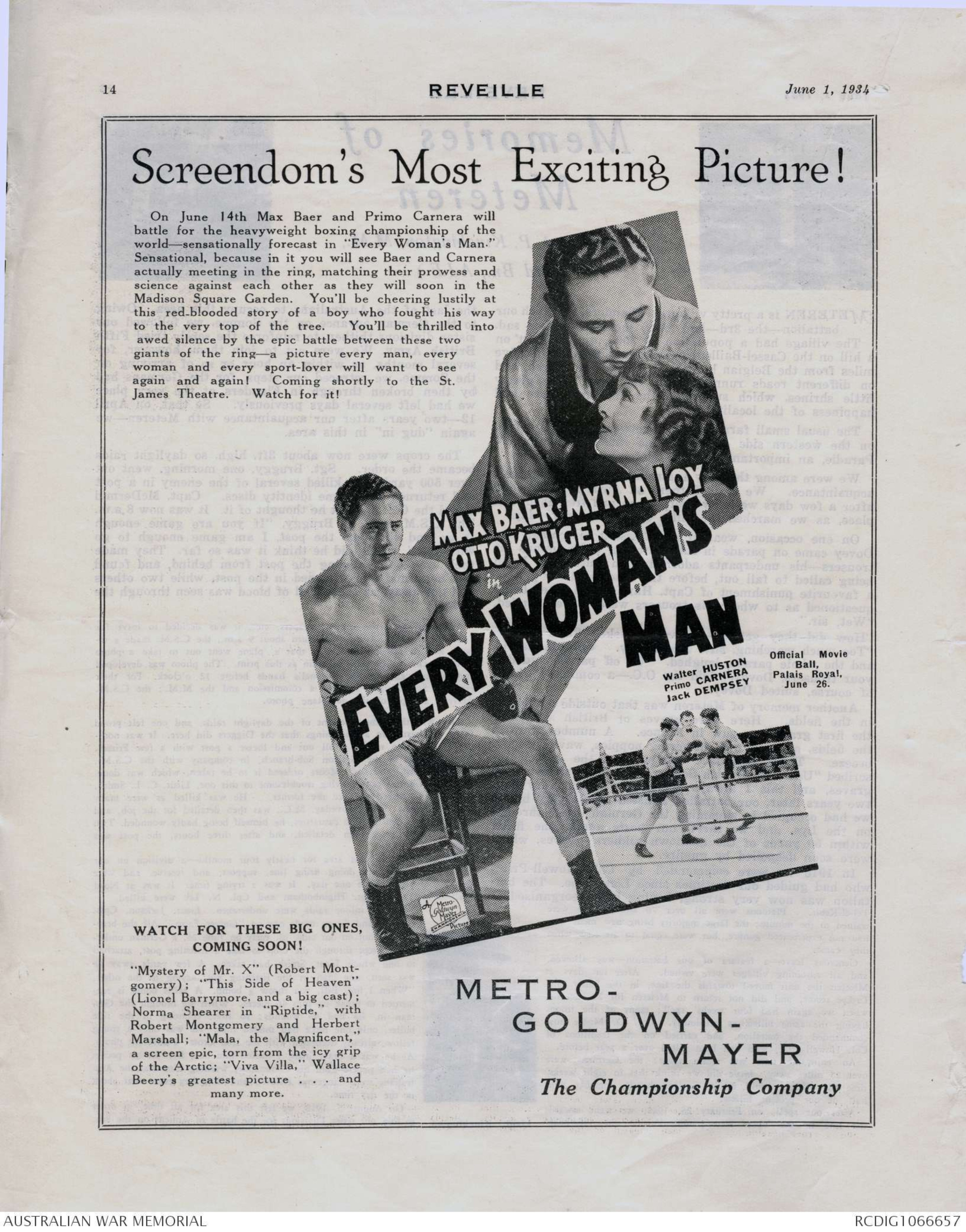

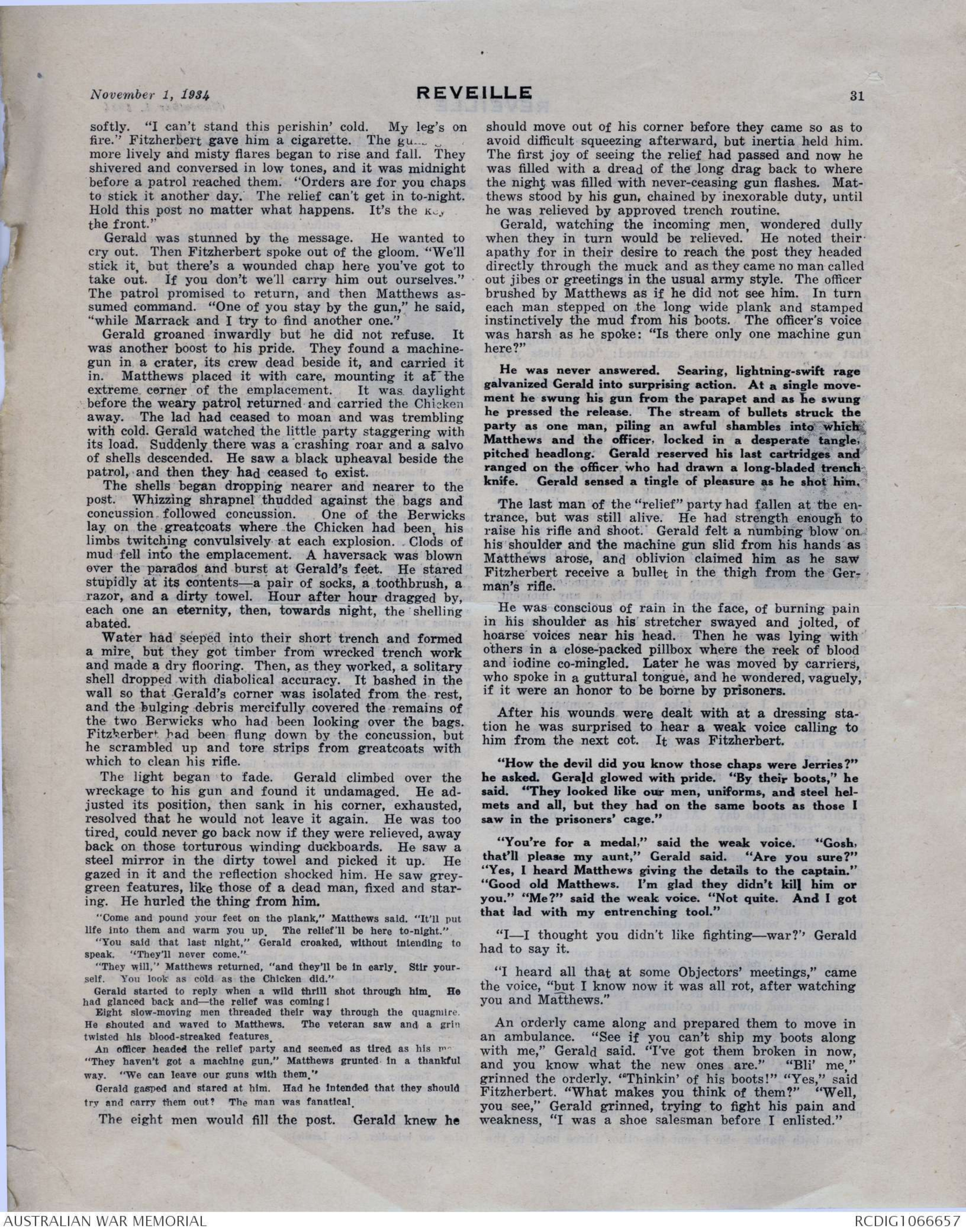

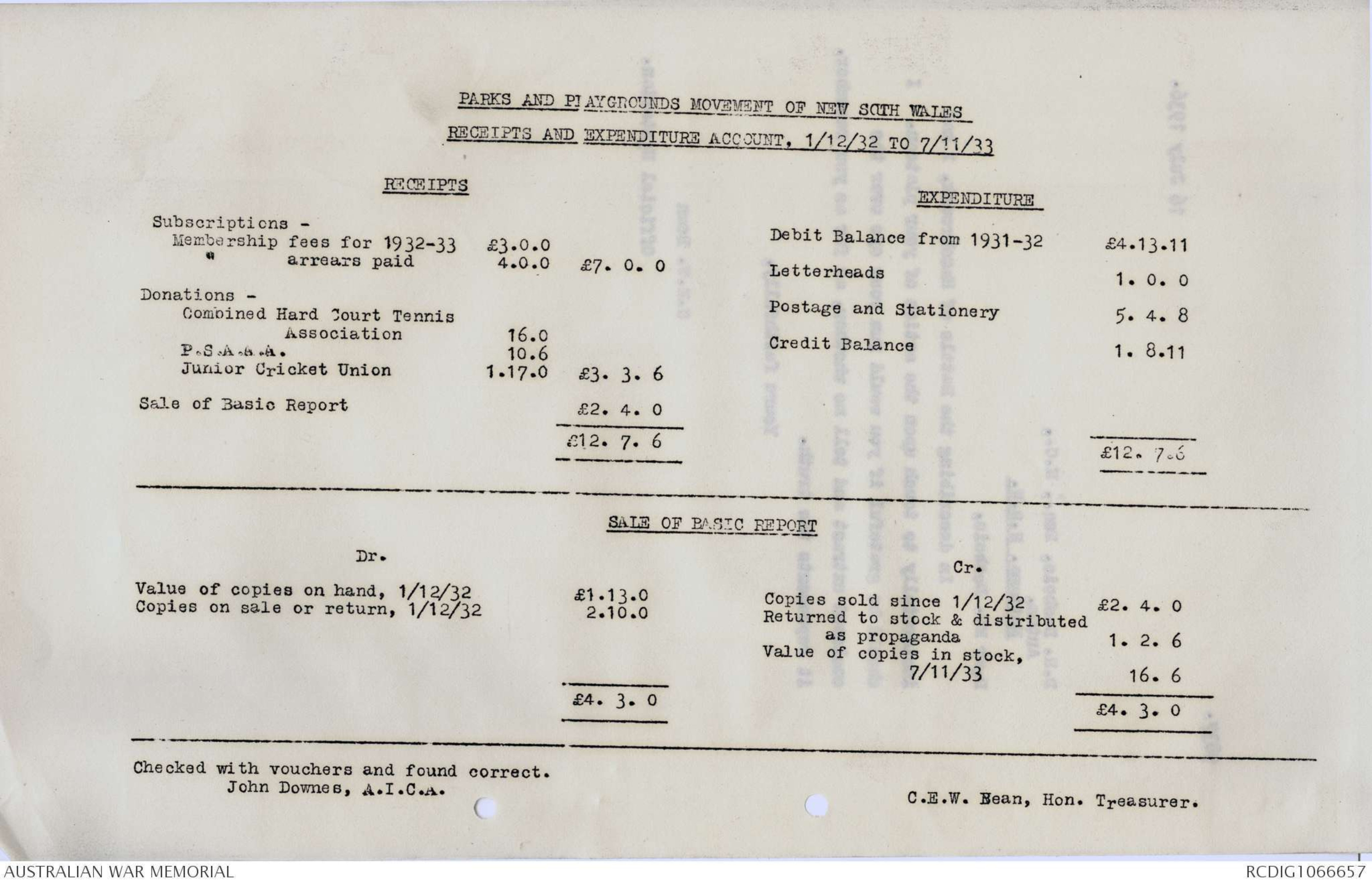
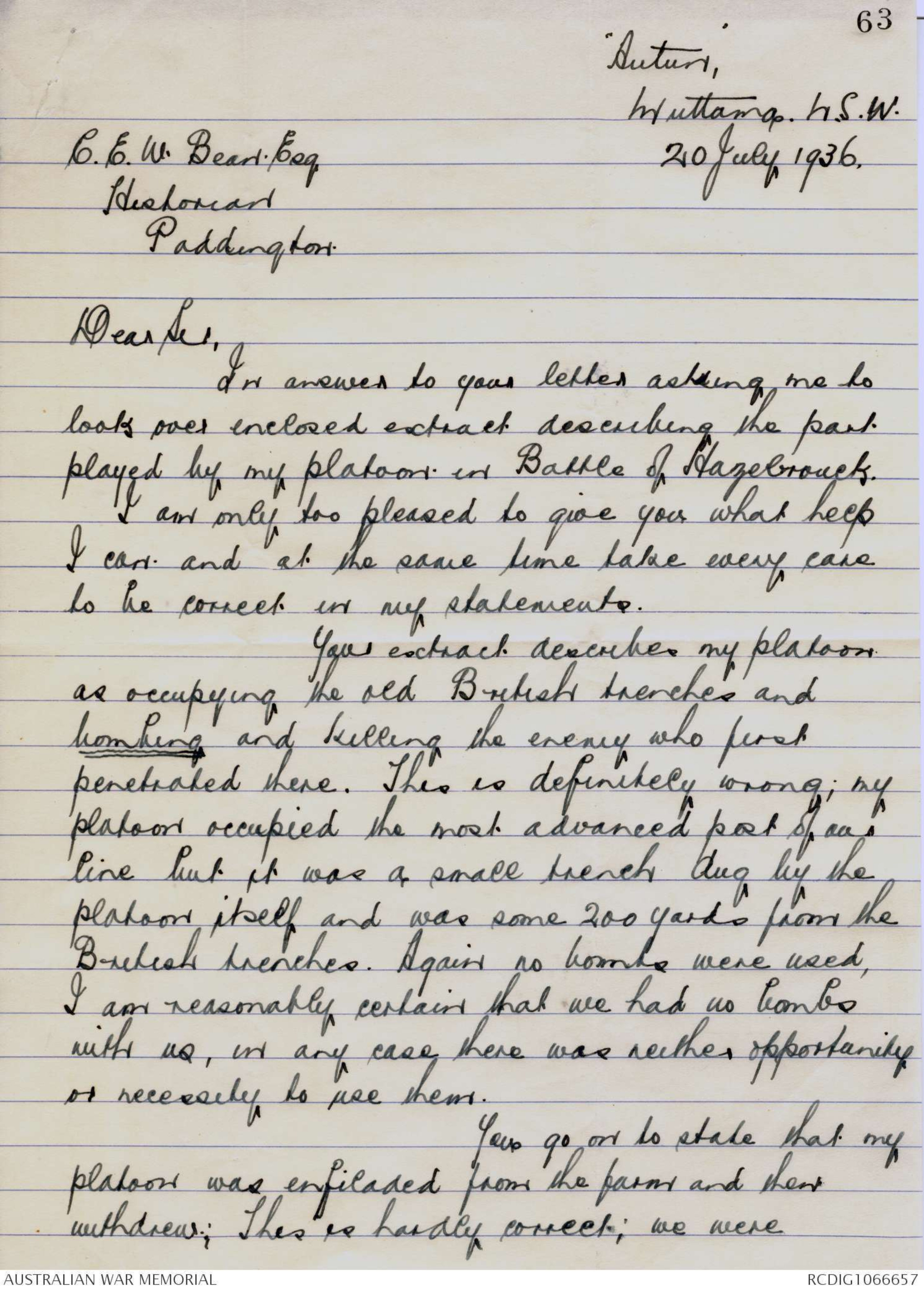
Right up to the Armistice, though, I kept wondering
where are they now? and what are they doing?
Then I stood in the crowd on the pavement in Oxford
Street and, with my Wife, watched them pass,
The last I saw of the change I treasured so greatly.
Even now I get letters and papers from them, and
it is such a pleasure to me to feel that I am
still remembered - The years pass on, the old
spirit of comradeship grows all the stronger -
My thoughts are always with you down under-
on Anzac Day, on Armistice Day and at Xmas.
I am back with you all. I feel, somehow, that
I have never left you. - Many must have been
sad to hear of Genl. Walker's death, - he was a grand
soldier and a great favourite: - Wagstaff and Andrew
Sheen have since "passed over" - Jerry Marsh lives
quite close to us, - we meet now and again and
swap news.- Old Lobo is not far away, but I
seldom see him - he is on several Directorates-
these keep him more or less employed - When I
last saw him he was his same old persuasive self,
very little changed in appearance, too - I have not
seen Birdie since your farewell dinner to him in
London in 1919, but I hear that he has aged a lot.
I fancy he had rather a hard time as C. in C. in
India. - You mentioned Gellibrand and Griffiths -
I have lost touch with both of them - What addresses
will find them? I have just read, with great
interest, the War History of the 3rd Battn - a good
bit of work by Wren - and every month I go
through "Reveille" from cover to cover, for news of
my comrades - That was a grand gathering at
Sydney on Anzac Day. - Ah! I long to see you
all again- My wife joins me in kind regards
to Mrs Bean and you, and in best wishes for
all happiness in 1936.- Please remember me
to any of the old hands whom you may meet.
Yours
W.B. Lesslie
H/N. 1st Division at Hazebrouck 1918. Gen Glasgow.
On August 4 General Plumer had a little church service on the
anniversary of the commencement of the war. At the end of it
he called Glasgow (and the officers of the 1st Australian Division
who were present) aside, and said that it was not his practice to
pay compliments or to bestow praise, especially with the war
still unended; but he would like to tell them before the 1st
Division left him - it was then known that it would be leaving
immediately for the south - that there was no other division,
certainly in his army, and, he thought, probably none in the
whole army, which had done so much to break down the German
morale as the 1st Austranlian Division.
13
June 1, 1934 REVEILLE
Memories of
Meteren
(By Lieut, P. Kinchington, M.M.,
3rd Bn., A.I.F.)
Photographs - see original document
Meteren is a pretty village in Flanders, of which our
battalion - the 3rd - had many memories - some sad.
The village had a population of 3000, and is built on
a hill on the Cassel-Bailleul-Armentieres Road, about five
miles from the Belgian border. It had a fine church, and
on different roads running from the town were pretty
little shrines, which suggested the one-time peace and
happiness of the locality.
The usual small farms abound, between some of which,
on the western side of the village runs the Bocque du
Paradie, an important place to Meteren.
We were among the first Australians to make Meteren's
acquaintance. We arrived there on April 10, 1916, and
after a few days we knew every stone and tree about the
place, as we marched for miles and miles every day.
On one occasion, wearied by incessant marching, Pte.
Dovey came on parade in full marching order, minus his
trousers - his underpants adorned with puttees. Upon
being called to fall out, before the assembled company –
a favourite punishment of Capt. Harris – and after being
questioned as to where his trousers were, Dovey replied,
"Wet sir."
" How did they get wet, Dovey?" asked Capt. Harris.
"Too much marching, sir," said Dovey. Captain Harris,
and the whole parade, laughed. "Go off parade and dry
your trousers, Dovey," said the O.C. – a command which,
of course, suited Dovey.
Another memory of Meteren was that outside our billet,
in the fields. Here were graves of British soldier -
the first graves we saw in France. A number were in
the fields, adorned with flowering poppies, waving in the
breeze. There were nice crosses upon the graves, inscribed
"Unknown British Soldier". I took a photo of the
graves, and this I always treasure. To the very day,
two years later, our battalion assisted at the very billets
we had occupied in stemming the German break through
on the Lys, and we threw our posts across the fields
within 50 yards of the unknown soldiers' graves, which
were soon despoiled by gunfire.
In 1916 we were commanded by Col. Howell-Price,
who had guided our destinies since Lone Pine. The Battalion
was now very strong, having been reorganised at
Tel-el-Kebir. Platoons were all over 70 strong, and were
trained to the minute; the large majority being new men, who
had not experienced gunfire, but were equal to all tests when
they came.
Generous leave – a feature of our battalion – was allowed,
and all the adjoining villages were visited. After ten days at
Meteren the unit moved towards the line, in the Sailly Sur-
La-Lys sector, and did not return to Meteren for 21 months,
when we again had four weeks' spell; many of the troops
having the same billets as previously. Col. D. Moore now
commanded the battalion, and carried on the traditions of
Col. Howell-Price, who had been killed over a year before.
An enjoyable time was again spent; the Germans were
over 25 miles away. Little did we think that in eight weeks'
time the village would be in German hands, together with
half of our present billets.
After our spell, on February 26, 1918, we went towards
the line in the Ypres sector; our division - the 1st- being
Photograph - see original document
[*Lieut. Kinchington.*]
the last of the Australians to occupy this area. Owing
to the German advance on the Somme, we followed our
sister divisions thither, to reinforce the sorely tried Fifth
British Army. We were not to join them, however, for
several months, as within an hour or so of arriving on
the Somme, we retraced our steps, for the Germans had
by then broken through in Flanders at the very place
we had left several days previously. So that on April
12 – two years after our acquaintance with Meteren – we
again "dug in" in this area.
The crops were now about 3ft, so daylight raids
became the order. Sgt Bruggy, one morning, went out
over 500 yards and killed several of the enemy in a post
and returned with some identity discs. Capt McDermid
asked the C.S.M. what he thought of it. It is now 8 a.m.
The C.S.M. said to Bruggy, "If you are game enough
to go and show me the post, I am game enough go
with you". Little did he think is was so far. They made
their way out, entering the post from behind, and found
two dead and two wounded in the post, while two others
had got away, as their trail of blood was seen through the
hedge.
After collecting the soldiers' papers, etc., it was decided to leave for
"health" reasons. After their return about 9 a.m., the C.S.M. made a report,
and so astounding was it that a 'plane went out to take a photo
of the tracks, which were as plain as this print. The photo was developed
and printed and in the Colonel's hands before 12 o'clock. For their
exploits, Sgt, Bruggy received a commission and the M.M.; the C.S.M.
received a copy of the aeroplane photo.
This was the commencement of the daylight raids, and one felt proud
to be an Australian at the things that the Diggers did here. It was nothing for them to take a stroll out and locate a post with a few Fritzes.
The president of the Grafton Sub-branch, in company with the C.S.M.,
located a post, and Col. Moore ordered it to be taken, which was done.
A second German post proving troublesome to this one, Lieut, C.L. Smith,
M.C., was ordered to take the former. He was killed as were many
of his platoon. Lieut. Loveday, M.C. was then detailed for the job, and
nearly all his men became casualties, he himself being badly wounded. Two
more platoons were then detailed, and after three hours, the post was
ours.
We continued in this area for nearly four months – a division on our
own – every few days doing firing line, support, and reserve, and were
not out of shell range one day. It was a trying time. It was at Nord
Helf Wood that Capt. Higinbotham and Cpl. N Lee were killed.
Several minor raids were undertaken. Lieut. Jackson, Cpls.
Conmee and Green made one on "Gutzer Farm". All the bravery
was not on our side, as, early on June 26, a German under-
officer crept through the crop to take a listening post, attached
to one which Lieut. Smith had taken. A few yards away he
was seen, one man in the listening post saying to the other,
"When I fire, Bill, you throw a bomb. A Mills bomb is segmented
to break up into 46 pieces. When we brought the German
in, he had 46 wounds; so that, counting in the rifle
bullet, only one piece had missed him. He was only a young
fellow, already decorated with the Iron Cross; I have his photo.
As he was a brave man, I buried him near by. In his pocket
he had papers from his Commander warning him that the Australians
were dangerous fellows, and that they even went about
in the day time.
On August 5, 1918, we left this area for all time, in order
to join our sister Divisions for the battle of Amiens on the 8th.
14
REVEILLE June 1, 1934
Screendom's Most Exciting Picture!
On June 14th Max Baer and Primo Carnera will
battle for the heavyweight boxing championship of the
world—sensationally forecast in "Every Woman's Man."
Sensational, because in it you will see Baer and Carnera
actually meeting in the ring, matching their prowess and
science against each other as they will soon in the
Madison Square Garden. You'll be cheering lustily at
this red-blooded story of a boy who fought his way
to the very top of the tree. You'll be thrilled into
awed silence by the epic battle between these two
giants of the ring–a picture every man, every
woman and every sport-lover will want to see
again and again! Coming shortly to the St.
James Theatre. Watch for it!
Photographs - see original document
[*Official Movie
Ball,
Palais Royal
June 26.*]
WATCH FOR THESE BIG ONES,
COMING SOON!
"Mystery of Mr. X" (Robert
Montgomery); "This Side of Heaven"
(Lionel Barrymore, and a big cast);
Norma Shearer in "Riptide" with
Robert Montgomery and Herbert
Marshall; "Mala, the Magnificent,"
a screen epic, torn from the icy grip
of the Arctic; "Viva Villa," Wallace
Beery's greatest picture . . . and
many more.
METRO - GOLDWYN-MAYER
The Championship Company
32
REVEILLE November 1, 1934
Gutzer Farm, Meteren
(by Sgt. P. ("Topsy") Turvey, D.C.M., M.M., 3rd Bn.,
A.I.F.)
Lieut. Kinchington's "Memories of Meteren" (Reveille,
June, 1934) recall to mind the hurried return of our division
to Flanders in April 1918. Stepping from railway
trucks (Hommes 40, Chevux 8 in. long) at Hazebrouck,
we were formed up and marched off towards Meteren.
What we saw during that night march I shall never
forget. Refugees of all ages and infirmity crowded the
roads, and at times it was most difficult to pass them.
They were heart-broken, and carried their few belongings
slung over their shoulders. One old lady, on being told
that we were Australians, exclaimed: "God bless you;
my boys".
Photograph - see original document
[*Sgt. Turvey*]
After tramping for some hours, a halt was called and
word passed back for all officers and N.C.O.'s to come
forward. Then Lieut-Colonel Don Moore
briefly explained the position to us.
A few miles ahead lay the village of
Meteren, which had been occupied by
the enemy that morning, but it was
unknown whether he had advanced any
further during the day. Between us
and Meteren, there was no line of defence.
We were instructed to closely
question any British troops met with
and get them to join us, and to beware
of spies dressed in British uniforms.
From now on we expected to come
in touch with Fritz at any moment.
The first batch of Tommies came
along and, on being asked what they
belonged to, one acting as spokesman, said "East Yorks
and West Lancs and fed oop". They had not seen an
officer or N.C.O. for days, and were in a bad way, but
they willingly joined up with us.
On reaching a position about 300 yards in rear of
Gutzer Farm, I was to take out my company Lewis
guns and act as a covering party, while new trenches
were dug. Tthe night was slipping away fast and we
knew Fritz would attack at dawn, so every man had to
"step" on it.
While scouting for gun positions in the semi-darkness,
I discovered the bodies of a young woman about 25 and
a girl of 8—they had evidently been caught by enemy
gunfire during the day. At the sight of those poor souls,
I saw "red" and swore to take toll of Fritz if an opportunity
came.
The digging operations being completed just before
daybreak, my guns were withdrawn to the front line.
But the position at Gutzer Farm appealed to me as an
observation post, and I received permission from Lieut
("Dad") Jarvis to take a Lewis gun out there. Four
men readily volunteered to come with me and carry
ammunition.
We had scarcely got into position, and were gazing out
towards the village of Meteren, over the undulating
country, when we saw miles of infantry slowly but surely
goose-stepping towards us. Officers on grey horses were
riding up and down the column. It was really a wonderful
sight. I sent one of my men back to H.Q. with a
message, and inside of a few minutes the most awful
slaughter was going on. Our artillery had got the exact
range. But, in spite of terrible losses, Fritz kept on
coming ahead and was soon within point-blank range of
my gun, so I decided to present him with 1150 rounds of
S.A.A. It was like firing into a haystack—one could not
miss. The Germans were about six deep in places. They
became very much unsettled in front, but kept creeping
up on both flanks. I sent the other three back to the
Anzac Memorial Book
Contemporaneously with the opening of the Anzac
Memorial in Sydney in November, there will be published
"The Book of the Anzac Memorial N.S.W." which will
authentically record how this striking
edifice came into being.
Photograph - see original document
The trustees of the Memorial have
entrusted the arrangements for compiling
and publishing to the Limbless
Soldiers' Association, which has the
assistance of a distinguished literary,
artistic, and business committee, of
which the State Governor (Sir Philip
Game) is a member.
To the Official War Historian (Dr. Bean) has
been entrusted the bulk of the literary work.
Other exclusive letterpress will be from the
pen of the War-time Prime Minister (Mr. W.
M. Hughes). The technical descriptions will
be by the brilliant designer of the Memorial
(Mr. C. Bruce Dellit), whose prose writings
are just as distinguished as his architectural
conceptions. Messrs, G. Rayner Hoff, the
sculptor and Leon Gellert, poet and litterateur, are also among the
special contributors. The Editor is Mr. S. Elliott Napier, President
of the N.S.W. Institute of Journalists.
The Illustrations—exclusive gravures—will be a special feature.
Every detail of the Memorial will be delineated in attractive form,
and in addition, the trustees have given permission for the reproduction
in this book of Illustrations from their own exclusive collection
of unpublished war photographs. Appendices will give interesting
information concerning the composition and achievements of
the Australian Forces, which the Memorial particularly remembers.
This publication, for which there must be a clamorous demand,
particularly because of its strictly limited issue, will be handsomely and
expensively bound in the finest of Morocco leather. The binding
and the paper—the paper was specially manufactured for the purpose
by a famous Scottish firm—are designed for permanency. The art
work will be the finest procurable in the Commonwealth, and the
printing of the highest standard.
Correspondence in relation to purchase of the book may be addressed
to Trading Department, Returned Soldier's League, Sydney.
___________________________________________________________
line while I emptied remaining magazines into Fritz. As
I finished, there were "Hocks" uncomfortably close, so
I grabbed the gun and bolted across No-Man's Land, followed
by a hail of bullets, and reached the trench without
a scratch, though one bullet tore a hole through the
back of my tunic. Can any of old "B" Company remember
shouting, "Come on, Turvey"?
The enemy now reformed his shattered lines and very soon came across
the open at us. Lieut. Jarvis would not allow any firing until the Germans
came well forward, and at that stage I saw the finest example of
bravery in my whole experience. A German officer, on foot, leading his
men, yelled out something like "Forwich, Forwich," but a volley from
our lines sent him and many others to grass.
However, he struggled to his feet and again called on his men to advance.
Another volley sent him in a heap, and it seemed that he was
done. But to our utter amazement, he gallantly struggled to his feet,
and, lurching unsteadily from one side to the other to get his balance,
called again, "Forwich, Forwich." This time he took the full count.
I also recall the bravery of Private O. A. Compton (of Goulburn). He
had lost a brother at Anzac in 1915, and had sworn to avenge him at the
first opportunity—and this was the first real chance he had of point-blank
shooting. With reckless courage he stood right up on the parapet and
put in some good work; but it was not long before he was hit, mortally.
Soon the attack fizzled out, and we began to feel pleased with ourselves.
One N.C.O. got out his shaving gear and had a clean up. Lieut. Jarvis
produced his tin whistle and played "Australia Will Be There" and some
German selections. Little did we suspect what was soon to be sprung upon
us.
Fritz was apparently annoyed at this rude hold-up. Suddenly, a fleet
of huge Gothas swooped down upon our lines, dropping bombs and
machine-gunning us viciously. Under cover of this, the German infantry
again attacked, but they were beaten men. Our losses were terrible—
good old Sergt, Jack Mott went west with many others of our best men.
The Tommies with us were the finest lads one would ever wish for.
Later, we took up a collection and a fair sum was handed to each. It
was with tears in their eyes and lumps in their throats when they
eventually had to leave us. That party and many others who similarly joined
us would afterwards have you know that they were "Lesslie's Own"
(after our brigadier. Gen Lesslie).
31
November 1. 1934 REVEILLE
softly. "I can't stand this perishin' cold. My leg's on
fire". Fitzherbert gave him a cigarette. The guns
more lively and misty flares began to rise and fall. They
shivered and conversed in low tones, and it was midnight
before a patrol reached them. "Orders are for you chaps
to stick it another day. The relief can't get in to-night.
Hold this post no matter what happens. It's the key [[to?]]
the front".
Gerald was stunned by the message. He wanted to
cry out. Then Fitzherbert spoke out of the gloom. "We'll
stick it, but there's a wounded chap here you've got to
take out. If you don't we will carry him out ourselves."
The patrol promised to return, and then Matthews assumed
command. "One of you stay by the gun," he said,
"while Marrack and I try to find another one."
Gerald groaned inwardly but he did not refuse. It
was another boost to his pride. They found a machine-gun
in a crater, its crew dead beside it, and carried it
in. Matthews placed it with care, mounting it at the
extreme corner of the emplacement. It was daylight
before the weary patrol returned and carried the Chicken
away. The lad had ceased to moan and was trembling
with cold. Gerald watched the little party staggering with
its load. Suddenly there was a crashing roar and a salvo
of shells descended. He saw a black upheaval beside the
patrol, and then they had ceased to exist.
The shells began dropping nearer and nearer to the
post. Whizzing shrapnel thudded against the bags and
concussion followed concussion. One of the Berwicks
lay on the greatcoats where the Chicken had been, his
limbs twitching convulsively at each explosion. Clods of
mud fell into the emplacement. A haversack was blown
over the parados and burst at Gerald's feet. He stared
stupidly at its contents - a pair of socks, a toothbrush, a
razor, and a dirty towel. Hour after hour dragged by,
each one an eternity, then towards night, the shelling
abated.
Water had seeped into their short trench and formed
a mire, but they got timber from wrecked trench work
and made a dry flooring. Then, as they worked, a solitary
shell dropped with diabolical accuracy. It bashed in the
wall so that Gerald's corner was isolated from the rest,
and the bulging debris mercifully covered the remains of
the two Berwicks who had been looking over the bags.
Fitzherbert had been flung down by the concussion, but
he scrambled up and tore strips from greatcoats with
which to clean his rifle.
The light began to fade. Gerald climbed over the
wreckage to his gun and found it undamaged. He adjusted
its position, then sank in his corner, exhausted,
resolved that he would not leave again. He was too
tired, could never go back now if they were relieved, away
back on those torturous winding duckboards. He saw a
steel mirror in the dirty towel and picked it up. He
gazed in it the reflection shocked him. He saw grey-green
features, like those of a dead man, fixed and staring.
He hurled the thing from him.
"Come and pound your feet on the plank," Matthews said. "It'll put
life into them and warm you up. The relief'll be here to-night".
"You said that last night," Gerald croaked, without intending to
speak. "They'll never come."
"They will," Matthews returned, "and they'll be in early. Stir yourself.
You look as cold as the Chicken did."
Gerald started to reply when a wild thrill shot through him. He
had glanced back and—the relief was coming!
Eight slow-moving men threaded their way through the quagmire.
He shouted and waved to Matthews. The veteran saw and a grin
twisted his blood-streaked features.
An officer headed the relief party and seemed as tired as his m[[en?]]
"They haven't got a machine gun," Matthews grunted in a thankful
way. "We can leave our guns with them."
Gerald gasped and stared at him. Had he intended that they should
try and carry them out? The man was fanatical.
The eight men would fill the post. Gerald knew he
should move out of his corner before they came so as to
avoid difficult squeezing afterward, but inertia held him.
The first joy of seeing the relief had passed and now he
was filled with a dread of the long drag back to where
the night was filled with never-ceasing gun flashes. Matthews
stood by his gun, chained by inexorable duty, until
he was relieved by approved trench routine.
Gerald, watching the incoming men, wondered dully
when they in turn would be relieved. He noted their
apathy for in their desire to reach the post they headed
directly through the muck and as they came no man called
out jibes or greetings in the usual army style. The officer
brushed by Matthews as if did not see him. In turn
each man stepped on the long wide plank and stamped
instinctively the mud from his boots. The officer's voice
was harsh as he spoke: "Is there only one machine gun
here?"
He was never answered. Searing, lightning-swift rage
galvanized Gerald into surprising action. At a single movement
he swung his gun from the parapet and as he swung
he pressed the release. The stream of bullets struck the
party as one man, piling an awful shambles into which
Matthews and the officer, locked in a desperate tangle,
pitched headlong. Gerald reserved his last cartridge and
ranged on the officer who had drawn a long-blade trench
knife. Gerald sensed a tingle of pleasure as he shot him.
The last man of the "relief" party had fallen at the entrance,
but was still alive. He had strength enough to
raise his rifle and shoot. Gerald felt a numbing blow on
his shoulder and the machine gun slid from his hands as
Matthews arose, and oblivion claimed him as he saw
Fitzherbert receive a bullet in the thigh from the German's
rifle.
He was conscious of the rain on the face, of burning pain
in his shoulder as his stretcher swayed and jolted, of
hoarse voices near his head. Then he was lying with
others in a close-packed pillbox where the reek of blood
and iodine co-mingled. Later he was moved by carriers,
who spoke in a guttural tongue, and he wondered, vaguely,
if it were an honor to borne by prisoners.
After his wounds were dealt with at a dressing station
he was surprised to hear a weak voice calling to
him from the next cot. It was Fitzherbert.
"How the devil did you know those chaps were Jerries?"
he asked. Gerald glowed with pride. "By their boots," he
said. "They looked like our men, uniforms, and steel helmets
and all, but they had on the same boots as those I
saw in the prisoners' cage."
"You're for a medal," said the weak voice. "Gosh,
that'll please my aunt," Gerald said. "Are you sure?"
"Yes, I heard Matthews giving details to the captain."
"Good old Matthews. I'm glad they didn't kill him or
you." "Me?" said a weak voice. "Not quite. And I got
that lad with my entrenching tool."
"I—I though you didn't like fighting—war?" Gerald
had to say it.
"I heard all that at some Objectors' meetings," came
the voice, "but I know now it was all rot, after watching
you and Matthews."
An orderly came along and prepared them to move in
an ambulance. "See it you can't ship my boots along
with me." Gerald said. "I've got them broken in now,
and you know what the new ones are." "Bli' me,"
grinned the orderly. "Thinkin' of his boots!" "Yes," said
Fitzherbert. "What makes you think of them?" "Well,
you see," Gerald grinned, trying to fight his pain and
weakness, "I was a shoe salesman before I enlisted."
9837.
16 July 1936.
D.R Desbois, Esq., M.C.,
Autum,
Muttama. N.S.W.
Dear Mr. Desbois,
In describing the Battle of Hazebrouch, I had
incidentally to touch upon the action of your platoon. I
should be grateful if you would run your eye over the
enclosed extract and tell us whether, as far as you remember,
it represents the truth.
Yours faithfully,
C.E.W. Bean
Official Historian.
PARKS AND PLAYGROUND MOVEMENT OF NEW SOUTH WALES
RECEIPTS AND EXPENDITURE ACCOUNT. 1/12/32 TO 7/11/33
RECEIPTS
Subscriptions -
Memberships fees for 1932-33 £3.0.0
" arrears paid 4.0.0 £7. 0. 0
Donations -
Combined Hard Court Tennis
Association 16.0
P.S.A.A.A. 10.6
Junior Cricket Union 1.17.0 £3. 3. 6
Sale of Basic Report £2. 4.0
_________
£12. 7. 6
__________
EXPENDITURE
Debit Balance from 1931-32 £4.13.11
Letterheads 1.0.0
Postage and Stationary 5.4.8
Credit Balance 1.8.11
SALE OF BASIC REPORT
Dr.
Value of copies on hand, 1/12/32 £1.13.0
Copies on sale or return, 1/12/32 2.10.0
_____________
£4. 3. 0
______________
Cr.
Copies sold since 1/12/32 £2. 4. 0
Returned to stock & distributed
as propaganda 1. 2. 6
Value of copies in stock,
7/11/33 16. 6
_____________
£4. 3. 0
____________
Checked with vouchers and found correct.
John Downes, A.I.C.A.
C.E.W. Bean, Hon, Treasurer.
63
"Autum"
Muttama. N.S.W.
20 July 1936.
C.E.W. Bean, Esq
Historian
Paddington.
Dear Sir,
In answer to your letter asking me to
look over enclosed extract describing the part
played by my platoon in Battle of Hazebrouck.
I am only too pleased to give you what help
I can and at the same time take every care
to be correct in my statements.
Your extract describes my platoon
as occupying the old British trenches and
bombing and killing the enemy who first
penetrated there. This is definitely wrong; my
platoon occupied the most advanced post of our
line but it was a small trench dug by the
platoon itself and was some 200 yards from the
British trenches. Again no bombs were used,
I am reasonably certain that we had no bombs
with us, in any case there was neither opportunity
or necessity to use them.
You go on to state that my
platoon was enfiladed from the farm and then
withdrew. This is hardly correct; we were
 Deb Parkinson
Deb ParkinsonThis transcription item is now locked to you for editing. To release the lock either Save your changes or Cancel.
This lock will be automatically released after 60 minutes of inactivity.